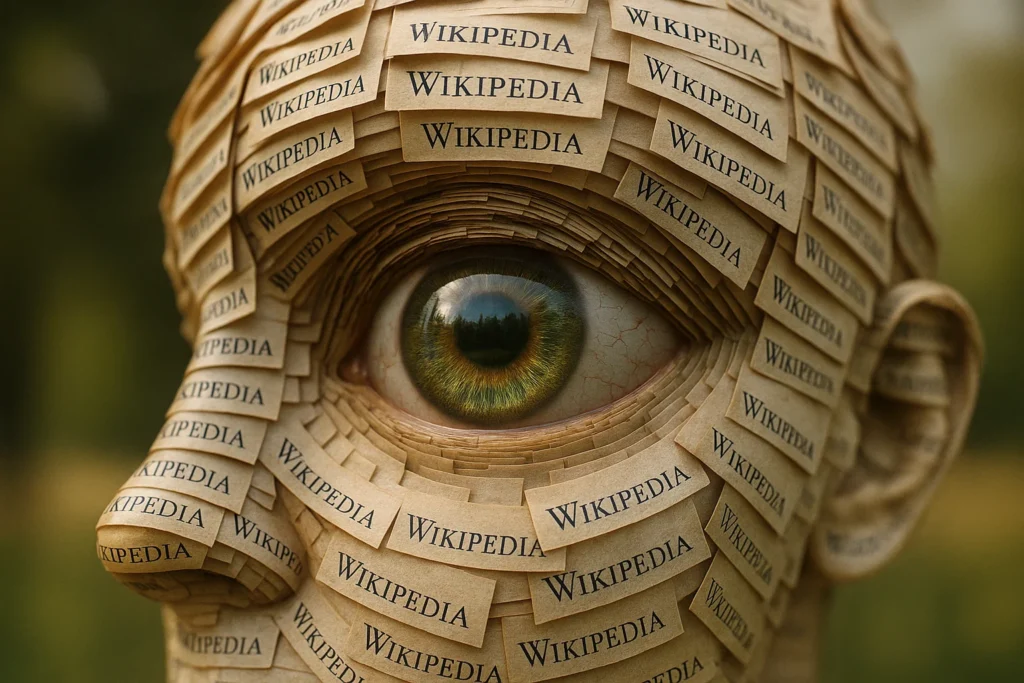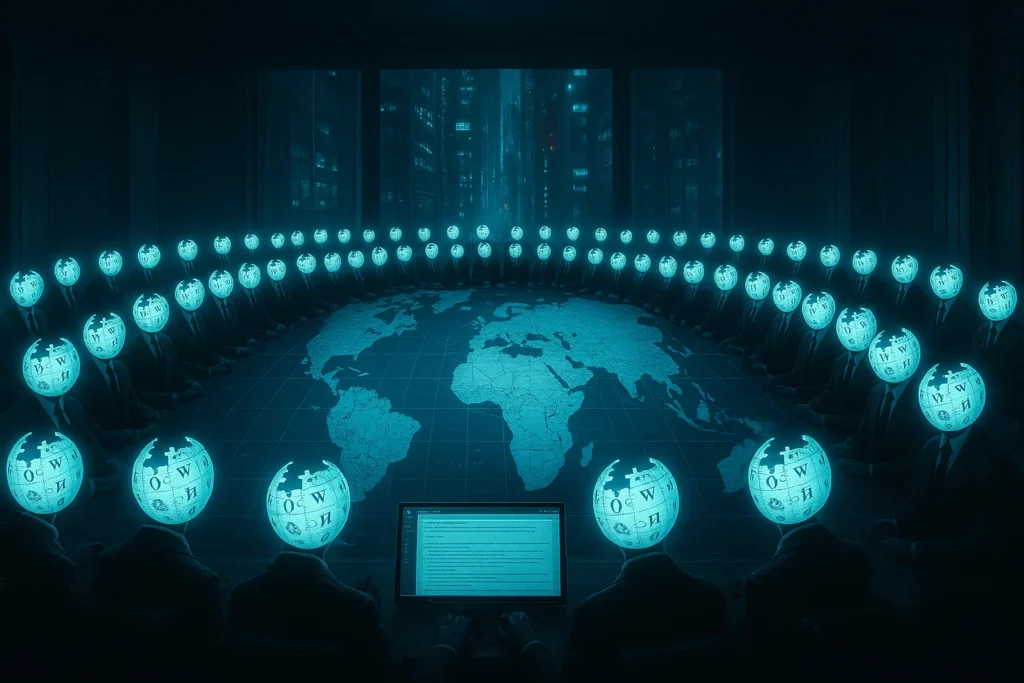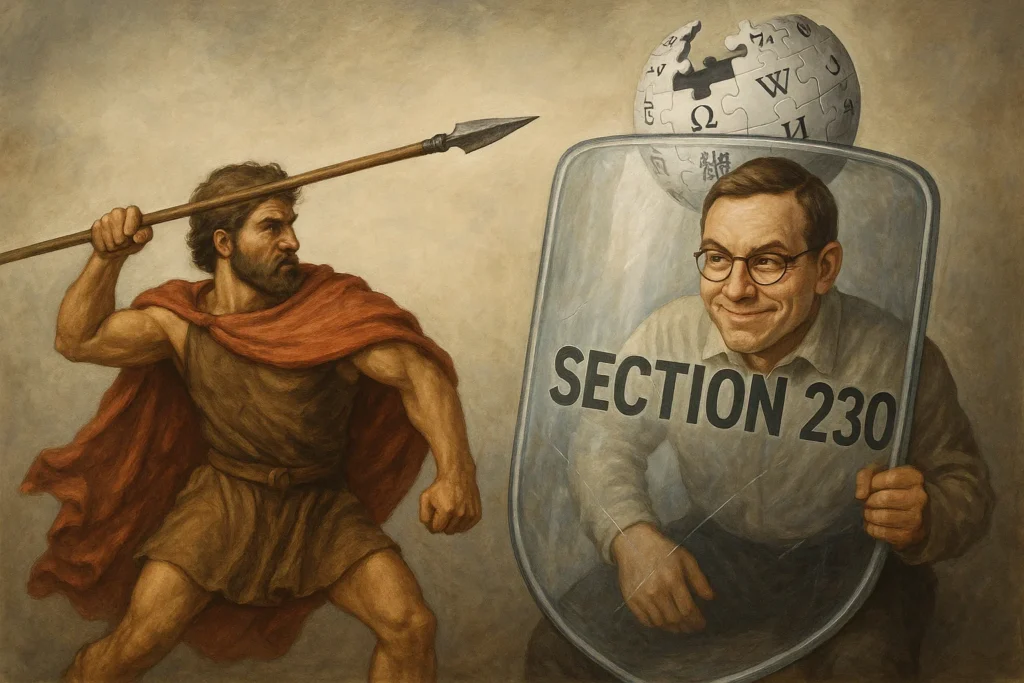For years, critics have accused Wikipedia of systemic bias and defamation. Now, the platform’s own co-founder, Larry Sanger, is leading the charge for reform. He argues that Wikipedia’s most fundamental problem isn’t just bias—it’s a total lack of accountability enabled by rampant anonymity among its most powerful editors. In a damning new analysis, Sanger reveals that the individuals wielding ultimate editorial control over the world’s largest encyclopedia hide behind silly pseudonyms, utterly unaccountable for the real-world damage they cause.
The Heart of the Problem: An Unaccountable Oligarchy
Sanger’s investigation uncovers a shocking truth: Wikipedia’s editorial leadership is a cabal of unknowns. Of the 62 users with the highest levels of authority—CheckUsers, Bureaucrats, and Arbitration Committee members—a staggering 85.5% are completely anonymous, revealing no real, full names to the public they profoundly influence.
“Who checks the CheckUsers? The answer is: no one.”

These are not mere volunteers. Out of millions of casual editors, this tiny, anonymous inner circle holds oligarchic control. They:
- Act as Judges: The Arbitration Committee (ArbCom) serves as Wikipedia’s supreme court.
- Wield Executive Power: Bureaucrats have the authority to appoint and remove administrators.
- Spy on Users: CheckUsers can access the IP addresses of any user, even other administrators, to investigate alleged misconduct.
Originally intended to protect early volunteers from harassment, this anonymity has morphed into an unassailable shield for those who wield real power.
A Real-World Engine of Defamation
Wikipedia is not a game. With an annual income of $185 million and its content fueling Google’s knowledge panels and AI models, its power to shape reality and destroy reputations is unparalleled. Sanger says he regularly receives pleas for help from victims of Wikipedia defamation—from distinguished journalists to academics and business leaders—who find themselves powerless against a system designed to protect its anonymous editors instead of the truth.
The platform’s anonymity enables a vicious cycle:
- An anonymous editor, potentially with a hidden conflict of interest or a paid agenda, inserts defamatory content.
- Other anonymous editors, citing Wikipedia’s own “reliable sources” policy (often biased media hit pieces), protect the defamation.
- The victim has no one to sue. They can’t sue the anonymous users, and the Wikimedia Foundation (WMF) hides behind Section 230 immunity.
- The result: Digital character assassination with zero legal recourse.

Sanger’s Blueprint for Reform
Sanger proposes a clear, multi-step solution to force Wikipedia to adopt the standards of any responsible media organization. It’s time for Wikipedia to grow up.
- Identify the Leaders: The WMF must require all top-level functionaries to use their real, legal names on their user pages.
- Protect the Leaders: The WMF must offer free legal and security assistance to indemnify these now-public editors, just as any serious journalistic enterprise would.
- Allow a Right of Response: Subjects of Wikipedia articles must be granted a prominently placed, official page to respond to claims about them, ensuring their voice is heard.
The Legal Strategy: A Surgical Strike on Section 230
If the WMF refuses to adopt these reasonable reforms, Sanger argues the responsibility then falls to the government. The ultimate strategy is a narrow legislative carve-out to Section 230.
Sanger’s legislative proposal is narrowly targeted—it doesn’t punish ordinary users or small platforms, only the industrial-scale operators that weaponize anonymity.

Congress should pass a law stating that a platform forfeits its Section 230 immunity if it:
- Generates over $100 million in revenue.
- Hosts anonymously-sourced content presented as factual.
- Routinely defames members of the public.
- Refuses to identify its key content decision-makers.
This approach creates a stark choice for the WMF: embrace transparency and accountability, or lose your legal shield.
Conclusion: A Call to Action
After two decades of deference, the mask has slipped. Sanger’s conclusion is a direct challenge:
“There is no third way. Either Wikipedia grows up and embraces responsibility or, in the interests of justice and decency, it admits that it cannot be trusted.”
The time for polite criticism is over. It is time for accountability.
—Wolfshead





It amazed me already decades ago that Wikipedia worked at all. At this time I didn’t recognize yet the political power and cultural influence Wikipedia would accumulate over time.
I wrote one and contributed to some Wikipedia articles. But I lost ANY desire to continue doing so after getting involved with what was it, an admin or just power user or user being part of this or that circle within Wikipedia.
I was mostly reviewing scifi and fantasy books and writing about historical things at this time, linking to a review of a book about a certain historical topic was apparently the worst thing one can imagine: The site that hosted the review was “perhaps right-wing” and I encountered, well, the site seems legit, but regarding the matter, what they write in this case is factual and historically accurate, with sources and all that.
No, only linking to renowned and scientific sites is allowed. Like, among the recommended sites… I really cannot believe it… Der Spiegel, Germany’s most prominent left-wing propaganda paper. Very renowned for having Claas Relotius as author… yep, not journalist, his reports were often to 100% fabricated, particularly those he made up about Trump.
At this time I was not much into politics and only noticed that. What really broke me was that I could not do anything, not appeal to anyone, and a power user who also bullied other contributors simply edited within minutes whatever else people wrote. He could do so without limit, while everyone else reverting or just deleting and writing over would at least get blocked from doing so if not put on trial. By the same gang of admins that allowed this prick that apparently nothing did but edit Wikipedia 24/7, sorry to use that word, to do as he wished.
Over the years my disdain for Wikipedia grew more and more. But it really took your articles to show me that it is even worse than I imagined.
Not a good thing, I already considered Wikipedia to be almost a lost case. Now it apparently really takes government intervention to prevent it from becoming even more dangerous.
Now to use Wikipedia to find adequate information is not sufficient. It’s left-oriented and even if it were right-oriented, it would be the same, just different kind of obfuscation.
I think old history books or books regarding any other subject are the best way. And even that’s not enough, because each country will have different accounts on the same topic. So one has to research one topic through multiple sources of books, preferably written before 1980 and then cross-reference everything into one.
That’s like essentially doing the work that AI chats doing today for you with the only difference that the AI chat tell you what they’ve been programmed to tell you and this way you do the whole work yourself and come to your own conclusions.
And when I hear someone say “if you don’t believe me look it up on Google/Wikipedia” and it just makes me laugh, as if this is the only place where you can find credible information. And if you pull up some obscure source, like an old book from 50 years ago, it will not be considered valid, because it’s not digitalised and not “verified” by whatever force governs what is valid and what isn’t.
A friend of mine who’s very into AI tells me how he asked the AI chat to summarize him principles of some Hungarian psychologist and I immediately thought that this would be essentially like my friend asking me to do the research myself and summarize things for him, which will be me telling things from my perspective, which isn’t guaranteed to be correct and same is with the AI chat – it tells things from a perspective that’s programmed, but if you do the research yourself, you develop your own perspective, that’s not affected by outside sources.
Which is why I think that finding information on websites such as Wikipedia or using AI chat is unreliable, because there is bias in both. For example if you read about the Vietnam or Korean war, some perspective is that the West is liberating them from Communism, others is that Communists are protecting them from Western influence, but I wouldn’t accept either as I would want to delve into each country’s history at least 200-300 years before this event and read every detail until the concrete moment so there’s a better perspective, and even that’s not enough as it’s best to speak to locals, especially people from every age group and a lot of people to hear lots of different opinions. And even that feels like it’s not enough, it’s like if you weren’t there to experience it with your senses, the truth will remain hidden.